SWAG! SWAG! SWAG!
If it’s good it’s
stolen. In a six part report from the frontline of music we bring you
the hottest property around. Why are Led Zeppelin hip? Why did
Chicago House take its revenge on Europe? And what the hell is
Vivaldi doing here? STUART COSGROVE, SEAN O’HAGAN and JAMES BROWN
report.
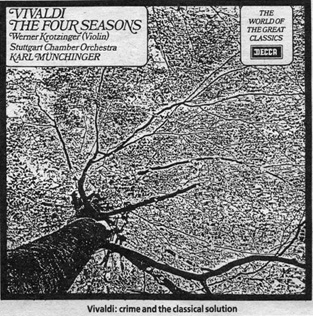
STEAL
GUITAR
“JAMES
BROWN
rules, he’s
really heavy, but rap music is hard—not
just the beat, the
attitude too—it has the same feeling as what we do.”
Charlie Benante, Anthrax
A
year ago you could have attributed that quote to any of the cocky
young, lean, black rap acts that were stalking out of New York
relying on their mouths as much as their music to gain them
attention. It would have been hip, quick, easy, and wrong. There’s
no possible way you could have considered it a comment from the
drummer with Anthrax, a band whose supercharged megaf**k metal guitar
playing never dropped below the speed of thrash and whose guitarist
Scot ‘Not’ Ian wore a field of stubble where his face should
have been.
When Rick Rubin’s dream of smashing rap with
metal into the Walkmans and households of the West was realised with
Run DMC, and Steve Tyler and Joe Perry of Aerosmith in ‘Walk This
Way’, all that was changed. It outraged the readers of Kerrang!,
proved
that everything big bad and brilliant was heading out of America, and
fast, and in one mighty riff it chopped the barrier between two of
the hardest, most conservative forms of music around — hip-hop and
metal.
Verbal aggression about pride, sex, depression and
having blood not smack in your veins were bouncing up and down and in
and about the beefiest guitar riffs since Led Zeppelin, AC/DC, and
The Sex Pistols, and that’s because they were the riffs of Led
Zeppelin, AC/DC, and the Sex Pistols.
It happened so
immediately and forcefully that Rick Rubin and his crossover ideas
became a fact of life in the time it took to hear just one 7”
single. And though it took the Captains of Brat the Beastie Boys, to
really make the white British Indie and rock communities wake up and
begin what the likes of the Three Wise Men had been doing for a year,
metal and hip-hop became inexorably linked.
Metal
and rap
have both been fortified by the injection of the other. A prime
example is the way The Cult, produced by Rubin, have exploded out of
their dreary image to become accepted as serious hard rocking
mothers. Likewise stolen metal riffs are now as much a part of
hip-hop as a mouth and a mike. John Bonham is becoming the staple
black dance beat, and The Stupids have taken to parodying Schoolly
D.
Steal it.
JB
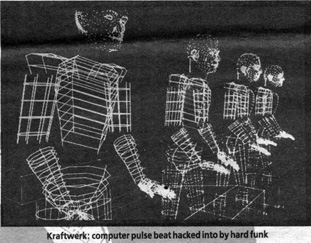
STEAL AND STEAL AGAIN
Hip-hop’s
mastery of the art of positive plunder has thrown up some obsessively
reconstructed rhythms, stolen and remodelled again and again in the
search for the perfect beat.
When
rap came overground in ‘79, it rode on the back of the last classic
disco groove, Chic’s ‘Good Times’. Disco’s epic swansong
became rap’s biggest staple
steal. Its taut bassline kickstarted the Sugarhill rhythm regime and
unleashed the fastest selling, biggest selling 12” debut in
history. The Sugarhill Gang’s ‘Rapper’s Delight’ utilised the
‘Good Times’ riff for an elongated tale of “hotel,
motel, Holiday Inn”.
Then
came the deluge: Spoonie Gee’s ‘Monster Jam’, Kurtis Blow’s
‘Christmas Rapping’ and The Sugarhill Gang’s ‘8th Wonder’.
By 1980, Chic’s ripped-off riff was everywhere. In the crossover
pop charts, Blondie joined the bandwagon with ‘Rapture’ and even
old lags like Queen saw the mileage in a half-inched bassline. If
‘Another One Bites The Dust’ was-the ultimate cheek,
then
the ultimate Chic
had to
be 1981’s colossal ‘The Adventures Of Grandmaster Flash On The
Wheels Of Steel’, a Sugarhill slice that plundered from all
the
previous ’Good Times’ takeaways. This was Ultra-Sonic Theft.
After ‘Adventures On The Wheels Of Steel’, there was
nowhere else to go but further out: Chic’s sleek disco insistence
gave way to the second great staple
steal, the
marathon minimalism of Kraftwerk’s Euro-electro. No one had
estimated the popularity
and
importance of Kraftwerk on the New York club scene, where
‘Trans-Europe Express’ was a turntable favourite with followers
of Flash and the ascendant Afrika Bambaataa. Then came ‘Planet
Rock’ in ‘82, a Bambaataa/Arthur Baker collaboration that
pushed the Tommy Boy label to the forefront of the electro scene.
Kraftwerk’s preprogrammed pulsebeat was the perfect base for
console trickery and, in the case of go-go, live experimentation.
‘Planet Rock’ stole from ‘Trans-Europe Express’ and
‘Numbers’; Trouble Funk’s startling ‘Trouble Funk Express’
mixed Kraftwerk with
the crankin’ beat and effortlessly created electro-go-go. The
Fearless Four’s ‘Rock In It’ rapped the odds over huge
dismembered chunks of ‘Man Machine’. The first age of Computer
Theft.
In
‘87, it’s back to basics. Side by side with the Rare Groove
soul-funk scene, rappers have turned to the Godfather, finally
finding the nerve to rip off the ruler, Mr James Brown. The biggest
club hit of the summer is Eric B’s ‘I Know You Got Soul’, a
hip-hop homage to Bobby Byrd’s original JB stomper of the same
name. With a huge James Brown back catalogue to rifle, the current
trend for crossing and recrossing the tracks should continue
unabated. Is this
what he
meant by the ‘Rapp Payback’?
S O’H

HOUSE
BREAKING
Chicago
House music is divine retribution, a thief’s charter that takes
revenge on disco, samples history ’til it screams-and redresses the
balance-sheet of pop. Theft has had two great generations -
then and
now. In the ‘60s, when Britain first managed to impose its
authority on pop; theft was the ace card in the entrepreneurial hand
of London-based record companies.
The
‘60s would never have swung without a bit of burglary, the great
landmarks of the British beat boom were simply stolen from black
American sources, then ‘tidied up’ for mass consumption. The
Beatles recorded The Isley Brothers’ ‘Twist And Shout’. The
Rolling Stones sanitised The Valentinos’ ‘It’s All Over Now’.
Cilla Black blanded the heart out of Dionne Warwick’s ‘Anyone Who
Had A Heart’ and The Moody Blues did untold decorative damage to
Bessie Banks’ ‘Go Now’. Even the decade’s greatest pop song,
Lulu’s ‘Shout’, was stolen from the Isleys.
House
has broken the mould forever. The first generation saw theft as
exploitation, one-way cultural traffic in which the authentic
voice
of black America was taken and toned down. But that was then and this
is now. In 1987, theft is emancipatory, the traffic flows in both
directions, every tune is a victim and every musician has the ability
to mug a passer-by.
The reverberating beat of Chicago House
is drawn from the critically repugnant wealth of old disco. Steve
‘Silk’ Hurley’s ‘Jack Your Body’ is a steal from old
Salsoul album tracks and Farley’s ‘Love Can’t Turn Around’ is
an updated version of Isaac Hayes’ ‘I Can’t Turn Around’. But
neither could exist without Europe. Whole rhythm sections from
some of
Chicago’s most successful Jack Trax are ripped off from the most
unlikely sources, from the critically repugnant wealth of Gary Numan,
from Depeche Mode, from Blancmange, from The Art Of Noise, New Order,
Cars and Yello. Chicago would never have happened if Munich hadn’t
discovered Donna Summer and Frankfurt hadn’t perpetuated
Euro-Disco. And today’s Chicago House dancers are lusting after
European avant-dance releases by Belgium’s Front 242 and The Young
Gods from Switzerland. House is the first black American sound that
relies on European pop for its inspiration: and he who steals from
the thief is blessed. SC
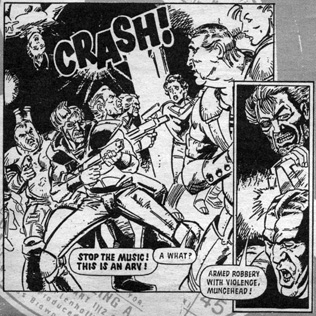
THE SUBLIMINAL STEAL
Or, spot the scratch. The
other side of sonic overkill is a place where the seasoned turntable
tea-leaf covers his tracks, leaving only buried clues or the merest
suggestion of his sources.
For
every Def Jam metal overstatement nicked intact from an old Led Zep
or Aerosmith album, there’s a host of subliminal steals courtesy of
clever kleptomaniacs like Curtis Mantronik. Everyone
from
The Art of Noise to Canadian metal mutha, Billy Squiers, has been
hidden amidst the Matronik techno-tyranny. You may have spotted the
Old Grey
Whistle Test
theme tune or snatches of Thin Lizzy’s ‘Johnny
the Fox’ in
his work but can you pinpoint the host of stolen signatures that make
up the mockingly titled ‘Who Is It?’ - subliminal theft at its
outer limits.
For sublime subliminal suggestion check out
Schooly D’s ‘Saturday Night’ album where the hard one’s
machismo is juxtaposed with DJ Code Money’s brutal minimalism. ‘We
Get Ill’ nicks the short piano crescendo from the Jackson 5’s ‘I
Want You Back’. Nothing more. Or for the perfect tonic to the Age
of Chance’s crass ‘Kiss’ overkill try General Kane’s ‘Crack
Killed Applejack’ which has a split second freeze frame of the
clipped Prince guitar riff. Here and gone, never repeated.
The MCs of RAP’s
‘Domination’ repeats the ‘Kiss’ motif in its opening bars,
the barest hint of intent that misleads even as it intrigues.
Whilst
the Ultra Magnetic MCs revisited and plundered garageland on
‘Travelling At The Speed Of Thought’, -
the main
source was The Kingsmen’s
‘Louie
Louie’ but buried in there, between 80’s state of the art hip-hop
hardware and 60s’ primal punk energy was a nagging cowbell beat;
curt, clipped and dislocated - The Rolling Stone’s ‘Honky Tonk
Woman’. In itself a secondhand blues swagger, now pulled into the
80’s, stripped to the bare bones, almost beyond recognition.
For
‘Big Decision’ That Petrol Emotion hiked ‘Agitate, Educate,
Organise’ from Brother D And Collective Effort’s ‘How We Gonna
Make The Black Nation Rise’. A crowbar of a cut.
The
subliminal steal is perhaps the most potent and provocative form of
plunder, stealing from the past whilst almost erasing it. Ask not for
whom the cowbell tolls…
SO’H
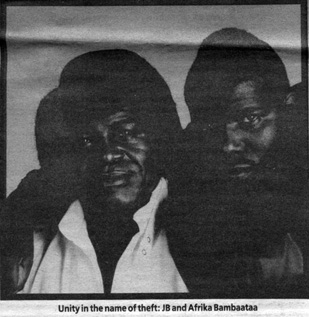
SNATCH
‘N’ SCRATCH
‘Say
Kids What Time Is It?’ is the best piece of sonic theft on the
block and DJ Coldcut is a pure monster. No one really knows who he is
but he embodies the spirit of ’87, snatching and scratching any
sound that catches his eye. Don’t give me that magpie stuff, this
DJ is a monster. Coldcut’s recycled 12” steals from every
imaginable source, Kurtis Blow’s ‘Party Time’, Trouble Funk’s
‘Drop The Bomb’, the soundtrack of Chitty
Chitty Bang Bang,
and when Walt Disney wisnae looking, he even stole bits from Jungle
Book.
Coldcut is the king of the swingers, a hip-hop VIP.
DJ
Coldcut is
a brazen dude. His first record snatches whole chunks from
Grandmaster Flash’s stolen masterpiece ‘Adventures On The Wheels
Of Steel’, you see in the world of the klepto and the cut creator,
DJs even steal from their best mates. Coldcut shows no remorse.
“Hip-hop places originality above everything else. The whole scene
is a fresh mutation of exciting sounds combined with new creativity.
Theft is no longer a crime or a disgrace.
It’s the norm.”
DJ Coldcut is the
prototype punk, a hip-hop mystery who made the most sought after
illegal club record on a domestic cassette recorder. Coldcut, king of
the pause button, likes to try the art trip on his followers. “Say
Kids is a musical collage very like the visual arts; like musical
Dadaism”. No-one believes him, the art talk doesn’t work, Van
Gogh had one ear, Coldcut has two, and he steals everything he
hears.
The snatch ‘n’ scratch style has led to the recent
release of another 12”, ‘Beats And Pieces’ by Coldcut and
Floormaster Squeeze, which is released this week on Ahead Of Our
Times. It has the same Wizardry as Double Dee and Steinski, it’s
already been played on legal stations like Capital Radio and is a
staple sound on the Pirate networks. Coldcut’s new release
assembles beats and pieces from James Brown’s ‘Make It Funky’
and adds stolen sounds from Schoolly D, Wild Magnolias, Full Force
and, wait for it, Vivaldi’s ‘Four Seasons’! Coldcut likes to
think he’s a classical buff, the Yo Boy’s revenge on Rachmaninov.
But more than that, he likes to think he’s the voice of democratic
dipping, “I’m the people’s pickpocket, the thief you can dance
to.”
SC
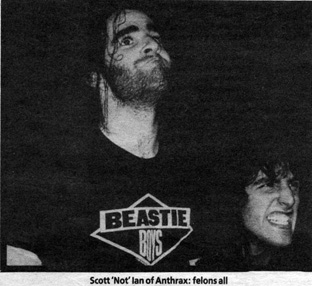
ARMED ROBBERY WITH
VIOLENCE
A.R.V.?
Armed robbery with violence, Muncehead. You can get 25 years for it
and with Renegade Sound Wave, Age Of Chance, The Young Gods, and The
Justified Ancients Of Mu Mu currently tooling up with total pop
pilfering the end of the century will be distributed, danced, and
discarded as quickly as a Top Ten hit. When John Lydon’s barking
sneer first crush collided with Afrika Bambaataa’s raw funk beat in
‘World Destruction’ three years ago they undoubtedly planted the
seed that is today charging with such vigour and direction through
clubland.
The
Indie
Charts have been pillaged, the Beastie Boys are currently the most
influential group in Britain (every unimaginative band in the country
now compare themselves to the Beasties in their press releases), and
even the goths, the soot haired death faced embodiment of rock
conservatism
in the 1980s, are starting to follow the grebo guidance of Pop Will
Eat Itself and Gaye Bykers On Acid and are now chicken wiggling to
Cult club mixes.
Crush, crotch, crash collision; sonic
architecture, and armed robbery, the descriptions are violently
aggressive but then again so are the records. When you’ve weaned
yourself on the noises of hard reggae sound systems (Renegade Sound
Wave), Swiss Air Force runways (The Young Gods), Test Dept and The
Four Tops (Age of Chance), and acid and heavy rock (Zodiac Mindwarp)
and then suddenly get hit by a hurricane of dance awareness that
every institution but the young want to ignore there’s no other way
it could have sounded but customised and powerful.
Whereas
the hippies wanted to give and the punks wanted to destroy, the
pilots of kamikazi collision only exist to steal. Listen to ‘Don’t
Take Five Take What You Want’ on The JAMMs LP or any Young Gods
track and you’ll realise that whilst most trad rock and pop bands
have been arguing the toss about politics, history, and religion,
those intent on making confrontational dance music have been rifling
and plundering from a stretch of popular music that begins with
Mendelssohn and ends with Janet Jackson.
They have created
and set about recording a channel of music which cuts straight
through all previous style barriers and walls of sounds. It is
flexible and imaginative,
and
throbs with the collective powers of pop, funk, soul, and punk. It’s
an armed robbery with violence, put your hands in the air, and hit
the deck.JB






